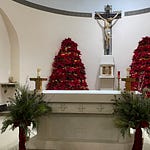Happy Easter! The Lord is truly risen! Alleluia.
This is the second Sunday of Easter. It concludes the Octave of Easter. For the past week, we celebrated as if it had been one long single day of Easter. If you have listened carefully, you will have heard that the Collet, the opening prayer, has been the same for the whole week. It is one long mass of celebration.
This week though was not without sadness. We learned of Pope Francis's death. Like Benedict and John Paul II before him, Francis was a very public person who became a known and welcome part of my life.
Today’s Gospel is appropriate for recalling Francis’s pontificate. In the Gospel of John, Jesus institutes the sacrament of Reconciliation by giving the apostles the power to forgive sins.
“Peace be with you. As the Father has sent me, so I send you.” And when he had said this, he breathed on them and said to them, “Receive the Holy Spirit. Whose sins you forgive are forgiven them, and whose sins you retain are retained.”
Francis often spoke of Christ’s mercy as being beyond human understanding. God’s mercy is divine. Francis was fond of saying, "God never tires of forgiving us.” This message of mercy was among Bishop Vincke’s fondest memories of meetings with Pope Francis. If you are on Facebook, I encourage you to go to the diocese’s page and listen to the bishop’s comments on Pope Francis’s life.
We can tire of confessing the sins that we cannot shake. But God does not tire of forgiving us if we ask for mercy. This is the message of peace that Francis so often proclaimed. It echoes Jesus' words to the frightened disciples. “Peace be with you.”
The second message of the Gospel concerns Thomas’s doubt. This is perhaps my most powerful memory of Francis. He asked us to look past the sins of the person and see the person. Let me explain how this relates to Thomas. Look up at the window with Thomas. He is looking at the finger that was supposed to probe the nail marks. It is the finger that was supposed to go into Jesus’ side. But it didn’t, did it? Instead, he said, “My Lord and my God.” Thomas believed. But still, we call him Doubting Thomas. We label him by his sin.
His sin labels him. We call him Doubting Thomas even though we should call him Believing Thomas, because that is the point of the Gospel. Thomas was converted.
Throughout his pontificate, Francis called people of all stripes and sins to come into the church. He believed in the big tent church, which caused both applause and condemnation. Too often, we label people by their sins or history. I think this was often misunderstood as Francis dismissing the significance of the person’s sins.
We are so much more than our sins. God calls each of us as children of God to a fullness of Grace. Francis often reminded us, though, that we need someone to lift us up if we are ever to transcend our human failings. In his book, “The Name of God is Mercy,” Francis says it is essential to seek help to leave behind repeated habits of sin that form into vices, addictions, and lifestyles leading away from God. God never tires of forgiving us. Francis encouraged us to never tire of seeking conversion of heart through God’s mercy.
My last thought on this Gospel passage is just a reflection on the simplicity of the scene. This style is characteristic of John’s Gospel. The storylines and images are spare. If you have time this week, read the conclusions of Matthew, Luke, and John’s Gospel accounts. The basic facts are the same between the Gospels. But John tells of Mary finding the empty tomb in simple images so that the Word of God may have primacy.
The simplicity of John’s style enables us to focus on Jesus as the Word of God. Pope Francis lived simply so that the Word of God would have primacy. Francis' simplicity of life was perhaps his most powerful tool of evangelization. Non-Catholics and people of no particular religion were drawn to his teaching because of how he lived. Francis often taught that the most powerful evangelization is a life lived within the Gospel.
Francis’s view on living simply was at the root of his teachings on the environment, like “Laudato Si.” Francis chose to avoid the trappings of power and the gaudiness of the papal office. This simplicity of eating and dressing was a way of life long before his election. I think this is one of the things that Americans most frequently “got” wrong about Pope Francis.
We hear his teaching to care for the environment and to forgo riches, and we hear him as criticizing us for our wealth and success. In this teaching, Francis is like a physician talking to a patient. He is trying to heal us of the unhappiness of disordered desires. Happiness is not found in excess material goods, according to Francis. I don’t always like to hear that. But then, when I am sick, I don’t always like what my doctor says, either. The difference is that Francis lived the simplicity he taught and was happy because of it. His life had room for God. Does yours?
Francis was the first Pope from Latin America. He was the first from outside of Europe, for that matter. Because of that, he often preached these three things: forgiveness, conversion, and simplicity as a way for us to see the universality of Catholicism.
Our church embraces many poor and rich regions and peoples as diverse as those in this room, and more. Christ taught us to embrace all peoples as our brothers and sisters. It is a path to Grace. Forgiveness, conversion, and simplicity. It is Christ’s universal call to holiness.









Share this post